Politics & Government
Lehi mayoral candidates face off in final debate
Published
2 months agoon
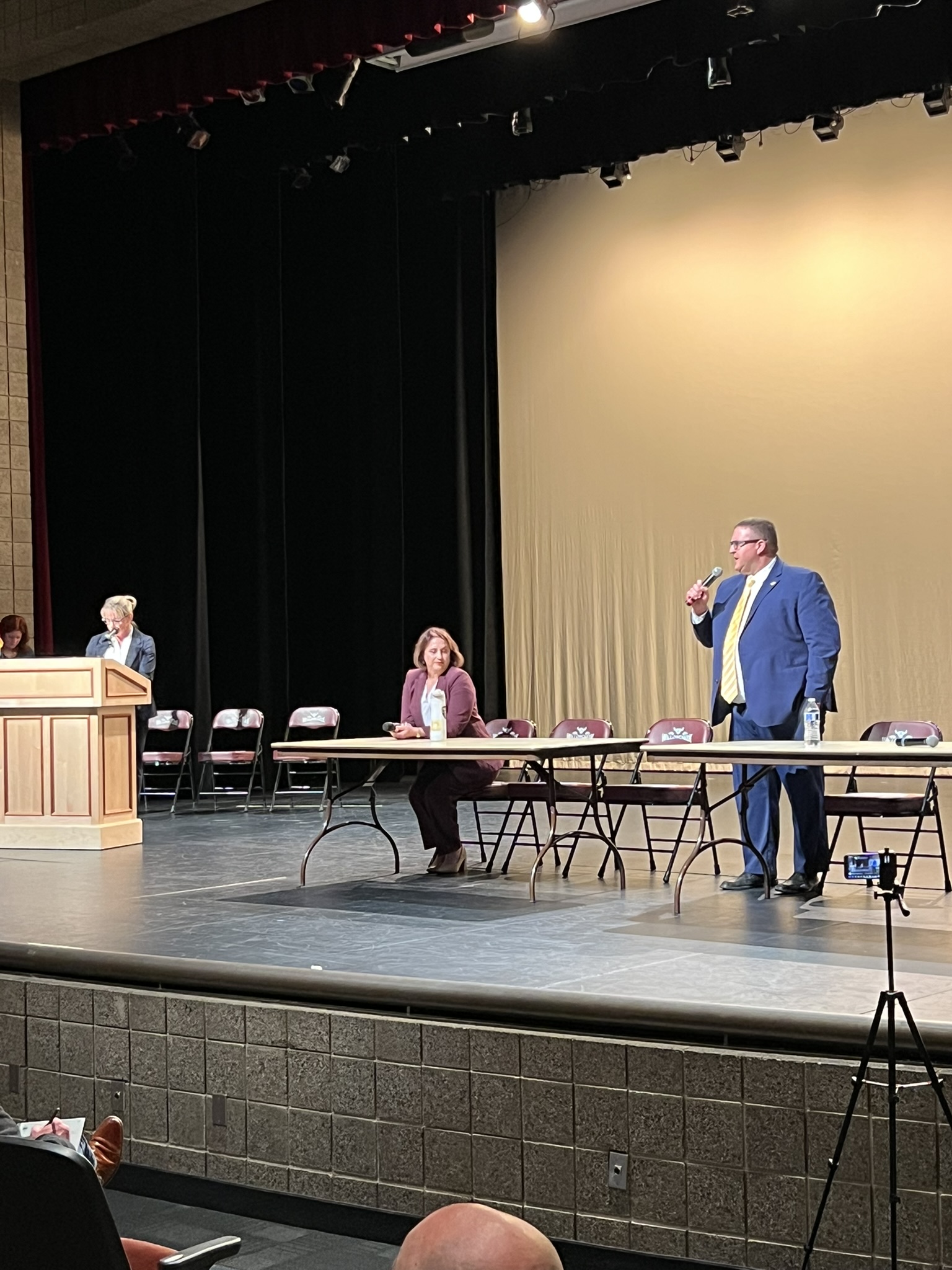
Matt Hemmert | Lehi Free Press
On October 15, Lehi’s two mayoral candidates answered questions in the final election cycle debate sponsored by the Lehi Free Press and Point of the Mountain Chamber of Commerce. The debate was moderated by Sally Francom, publisher of the Lehi Free Press, and questions were gathered from the public and the Lehi Free Press editorial board.
(Candidates are listed alphabetically by last name)
Paige Albrecht
Candidate Paige Albrecht outlined her vision for the city’s future, pledging full-time dedication, fiscal responsibility, and stronger community connections. Rejecting any notion that the mayor’s role is part-time, Paige announced she will leave her current job at a law firm to serve Lehi residents full-time—without requesting a change in title or salary. “That’s what Lehi deserves,” she said, emphasizing accessibility and active leadership in regional decision-making.
On budget priorities, Albrecht defended recent spending cuts and cautioned against “funding fluff,” saying the city must focus on completing parks rather than spreading funds too thin. She pointed to recent efforts to finish Willow Park—where over 100 trees were planted—and highlighted ongoing work with County Commissioner Beltran to explore a cost-effective plan for an ice rink.
Albrecht also unveiled an infrastructure deferral funding plan, which she said was a proposal to use Lehi’s budget surplus to pre-finance road and infrastructure projects that the Mountainland Association of Governments (MAG) intends to fund in coming years. Citing successful models in Saratoga Springs and Santaquin, she said the initiative would allow Lehi to accelerate improvements rather than wait for state funding. She further expressed support for pursuing a 1900 South east-west corridor to ease congestion, opposing further Pioneer Crossing expansion due to its impact on local homes and businesses.
In addressing city finances, Albrecht underscored the importance of maintaining strong reserves, citing lessons from COVID-19. She supports keeping 100 days of reserves for utilities while using excess funds for one-time projects—such as infrastructure loans and improved digital communication tools for residents.
Albrecht detailed her involvement in regional homelessness initiatives, explaining that Lehi’s contributions have helped fund a consolidated warming center in Provo with enhanced safety and infrastructure. She volunteered to continue representing Lehi on that committee.
Drawing from her master’s degree in public service, Albrecht identified gaps in Lehi’s code enforcement system, proposing the use of AI-based tracking programs and dedicated Lehi Police Department officers to improve efficiency and safety.
A long-time supporter of the arts, Albrecht defended maintaining 30% of PARC tax funds for cultural programs, encouraging partnerships with local businesses to expand opportunities.
She also vowed to enhance communication between city government and residents through regular updates and new tools integrated into the city’s website.
Albrecht reaffirmed her commitment to transparent leadership, noting her campaign’s broad grassroots support and emphasizing that her “vote cannot be bought.”
Albrecht’s closing statement: “I would like to express again my appreciation to all of you for coming. It really means a lot to everybody up here that you’re here. And it’s so nice to connect directly with residents. It’s really wonderful. It’s the job. In terms of why I am running and what I intend to do: I am a collaborator. Leadership is important, but we cannot make progress without collaboration. I’ve learned how important it is to build bridges instead of walls. I’ve seen how dysfunctional councils work—and it’s much the same as dysfunctional federal government. It’s gridlock. Nothing gets done. Nobody’s proud of it. I think that’s a really important priority. Our budget is strong. Our bond rating is incredible. We have one of the safest cities in America. We’re doing a lot of things right. It’s why I love to live here. It’s why you love to live here. It’s important to preserve that and, moving forward, to be able to work with the community to continue making this happen. I love Lehi. I would be honored to serve as your mayor. Thank you for your time.”
Paul Binns
Candidate PaulBinns presented his vision for Lehi’s future, emphasizing fiscal responsibility, infrastructure expansion, and community collaboration while leveraging his 25 years of business experience. A long-time Lehi resident and insurance business owner, Binns said his large staff and flexible schedule will allow him to dedicate full-time hours to serving the city, though he believes the mayor’s role should remain a part-time paid position for now.
Binns praised Lehi’s city staff for their professionalism and commitment but said the city must better prioritize how funds are spent. He called for balanced investment in parks across all neighborhoods rather than concentrating resources in a single location. He expressed disappointment in the condition of Willow Park and frustration that Mellor-Rhodes Park remains undeveloped after a decade, urging a more equitable approach to park maintenance and completion.
Traffic congestion, Paul said, remains the number one issue among residents. With Lehi’s last major road project—Pioneer Crossing—dating back to 2010, he promised to make transportation improvements his “day one priority.” He advocated for stronger partnerships with Eagle Mountain, Saratoga Springs, and state transportation agencies like UDOT to secure funding and coordinate long-term infrastructure plans.
Binns also stressed the importance of using the city’s rainy-day funds responsibly, warning against overfunding reserves while critical needs like public safety go unmet. Having joined police ride-alongs, he praised Lehi’s officers as “unbelievable” but said they are overworked and understaffed. He pledged to work closely with Chief Darren Paul to strengthen public safety budgets over the next five years.
To improve neighborhood standards, Binns proposed creating adedicated code enforcement department thatoperates separately from police. He said civilian code officers, under the Planning Department, could handle most cases efficiently while involving law enforcement only when necessary.
Regarding arts and culture, Binns—whose wife is an actress—called the arts “something we have to preserve.” While recognizing other budget priorities, he opposed cutting arts funding and said business partnerships could help the arts program grow sustainably.
Binns described himself as a political outsider with extensive leadership experience in business and other organizations, including serving as president of a political action committee. He said his management of “multimillion-dollar budgets and large teams” equip him to guide Lehi through its next phase of growth.
In response to Francom’s questions about how Lehi would comply with the Utah State Legislature’s affordable housing mandate, Binns argued that Lehi has “done its fair share” and urged the state to allow the city time to catch up on infrastructure before adding more density. His overall message focused on accountability, collaboration, and ensuring Lehi’s growth is supported by the infrastructure and leadership it needs.
Binns’ closing statement: “This has been a great opportunity to come out and answer some questions. As we’ve been out in the neighborhoods and knocking doors, in cottage meetings, and meeting with each of you and expressing how we feel about the direction of this great city, I’m an optimist. We live in an unbelievable place. Really, truly an unbelievable place. We have unbelievable people. And I would side with Paige that our staff and our city office are next to none. They do a tremendous job. But I believe a leader is needed—to get in, to find our weak spots, to make them better, and take this city to the next level. There are a lot of things in our city that are not 21st-century. They need to become 21st-century in a quick turnaround. But we have the staff, we have the know-how to do it. I am running for the job of mayor because I want a leader. I am a leader. I am happy to lead, excited to lead, and I ask for your vote—and your neighbors’ votes. I appreciate your time tonight.”
The entire debate can be viewed by clicking here or navigating to the Lehi Free Press’ Facebook page. The General Election will be held on Tuesday, November 4. Ballots may be returned by mail, but must be received by the Utah County Clerk’s office on or before November 4. Otherwise, voters may vote in person on November 4or deposit ballots at the official drop box located on the south side of the Lehi Public Safety Building until 8 p.m. on November 4.
In this story, AI was used to generate transcripts and summarize direct quotes. Transcripts and summaries were checked to ensure they met the Lehi Free Press’ ethical and accuracy standards.

You may like
-
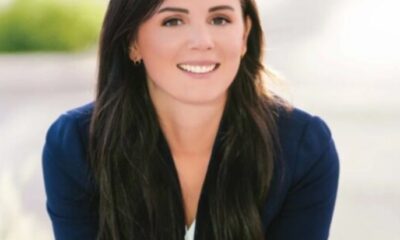

Emily Lockhart to fill open seat on Lehi City Council
-
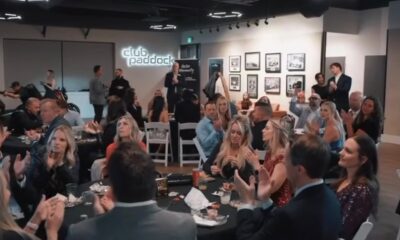

“Passion into purpose”: Local supercar owners donate over $60k to Make-A-Wish
-


United Way of Utah County brings Christmas hope to hundreds of families
-


QR codes add modern convenience to Lehi’s historical markers
-


The Ruth’s “A Christmas Carol” a magical holiday tale
-
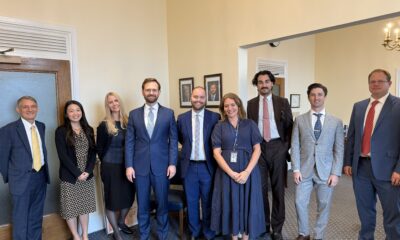

Local child protection group takes its fight against big tech to the FTC
-
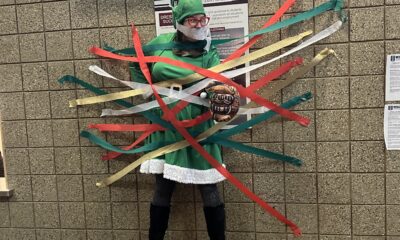

Willowcreek administrators spark holiday cheer for students
-


Teen entrepreneurs showcase innovation at Christmas market
-
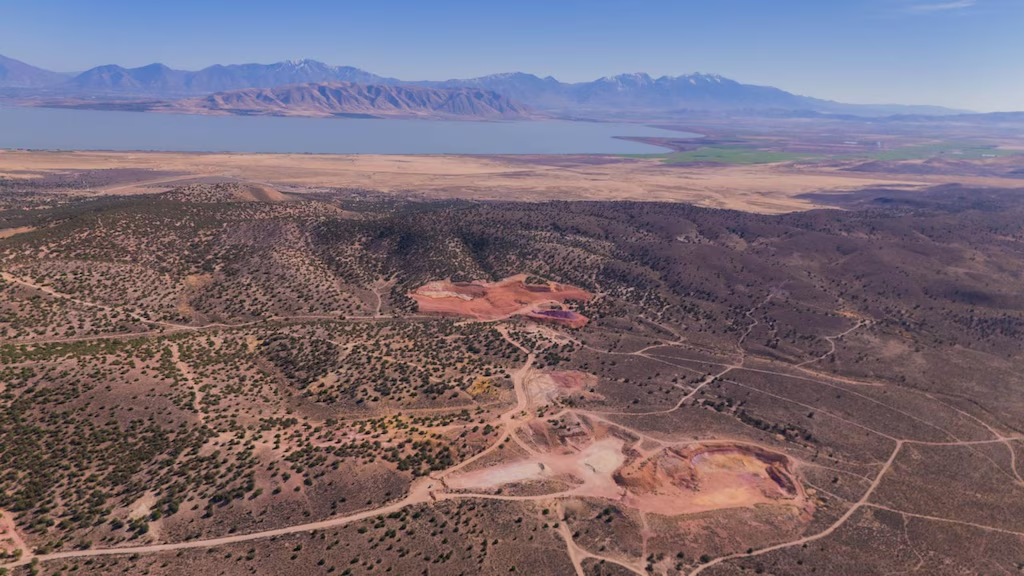

Why a new mineral find near Utah Lake is drawing national attention
-
Aspen Peaks School Board approves budget, launches staff searches and boundary study

